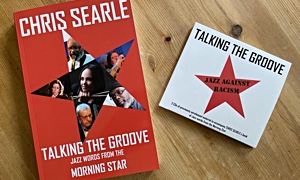Home » Jazz Articles » Book Review » Who Owns Music?
Who Owns Music?
 Who Owns Music?
Who Owns Music? William Parker
Buddy's Knife
2007
Bassist and polymath William Parker's world is huge. Like Charles Mingus or Anthony Braxton, Parker's art is like an enormous quilt. He slowly, deliberately, adds squares to the fabric of a design that is probably bigger than could be completed in a single lifetime. For Parker, it's not just the compositions, not just working with musicians and the ways they interact. It's not just the poetry and painting and dance he incorporates into performances. His work is about community in a proactive, philosophical way, the building of artistic relationships that become a microcosm of the way the world ought to behave: if the UN were replaced by his Little Huey Creative Music Orchestra, we'd have less wars and more flower gardens.
Parker's writings, usually published in small-run chapbooks, have long been the most overt spelling out of his creed (at least insofar as words carry more syntactical weight than a doson 'ngoni solo). While those have been hard to find and many no doubt long gone, the German publisher Buddy's Knife has collected excerpts from his Sound Journal, Mayor of Punkville, Document Humanum and Music and the Shadowpeople as well as some unpublished poetry in Who Owns Music?, a slim volume that provides a good vantage into Parker's soundworld.
The book works at once as biography, philosophy, mythology and poetry, concerning not just various topics regarding the making of music but the processes of public education and governmental rule. As Parker writes: "I didn't trust schools because at an early age I began to hear voices. I never heard a voice coming out of school that said anything I could relate to. The voices I heard were from the streets and the oral histories of the people...I was always more interested in the spirit than the mind. It was my dream in early years to become a teacher. I could imagine everything school should be and was not. Early on I knew it was possible to nurture and develop the individual voice of each human."
Parker includes here three pages of thoughts about other bassists (something sure to interest jazz obsessives) and consideration of economic stability for artists and the pull of grant funding. He muses about what it means to improvise and to simply be human. And while it could be argued that the topics are given slight attention, coming off (as they no doubt are) more as jottings in notebooks than a fully realized treatise, the book does much to inspire thought. These are more parables than arguments, coming from a faith-based foundation and meant, presumably, more to inspire than convince.
Parker is, after all, more interested in the spirit than the mind, in the collective over the individual existence: "It is the job of the artist to incite revolution, to uplift the receiver of that art so as to see the best way to live on earth, to move those who box life in to understand a more whole concept of existence, to see that it is life which is most important, not the life of the individual but the process of living (the how and why), not just staying alive and existing, but living as full creative beings, taking the step not when it is safe, not out of survival, but out of compassion and love of truth."
It goes beyond the prose, however, and Parker practices what he preaches. He doesn't employ high school students in his bands because they're the best musicians in New York (as an example) but because they are the future of New York, and the future of what he succinctly refers to as "the music. The fact that Parker doesn't just write about but works to realize what the world could be is what gives Who Owns Music? its strength.
< Previous
The Unbelievable Truth
Next >
Single Engine
Comments
Tags
For the Love of Jazz
 All About Jazz has been a pillar of jazz since 1995, championing it as an art form and, more importantly, supporting the musicians who create it. Our enduring commitment has made "AAJ" one of the most culturally important websites of its kind, read by hundreds of thousands of fans, musicians and industry figures every month.
All About Jazz has been a pillar of jazz since 1995, championing it as an art form and, more importantly, supporting the musicians who create it. Our enduring commitment has made "AAJ" one of the most culturally important websites of its kind, read by hundreds of thousands of fans, musicians and industry figures every month.
























